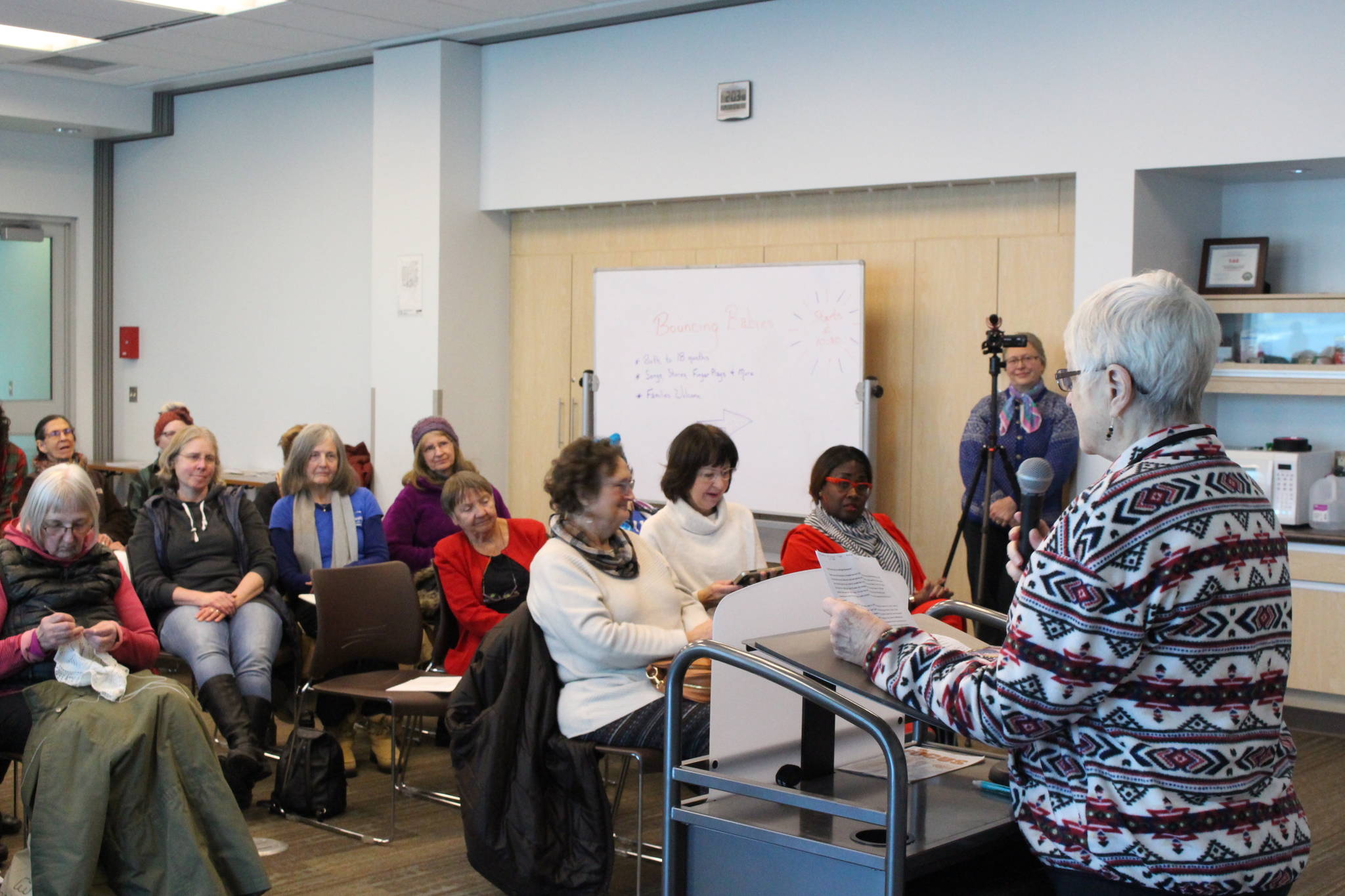In celebration of the 100th anniversary of women securing the right to vote in America, several dozen men and women from the Kenai Peninsula gathered at the Soldotna library Saturday and reflected on the history of the women’s suffrage movement while discussing what is left to be done in the realm of gender equality.
The Centennial Voices event featured a speech by Marge Mullen, one of the earliest homesteaders of the Soldotna area, who will also be celebrating her 100th birthday later this year. Mullen was out of town for the event but was able to speak to the attendees through a live video feed.
“I’m really happy that you decided to celebrate this date, because we are one half of the world, and each of our votes are powerful,” Mullen said. “We have to remember that.”
When Mullen was born on June 25, 1920, her mother had not yet gotten the right to vote. That moment would come later that year when the 19th amendment to the U.S. Constitution was officially adopted on Aug. 26, 1920. Mullen said that her mom did vote for the first time that year, and Mullen herself has voted in every election that she could, from presidential races to the board of the local historical society.
Mullen first spoke of how she and her family arrived in Alaska in 1945 and went from living out of a tiny apartment in Chicago to owning over a hundred acres of land in the area that would eventually become Soldotna. Afterward, audience members asked Mullen questions, including what she wanted to see for the future of her daughters and granddaughters.
“Well, I hope that they all become well-educated and return to Alaska, if that draws them,” Mullen said.
After Mullen had spoken, Charlissa Magen, Cathleen Rolph and Sammy Crawford, members of the local chapter of the League of Women Voters, went into detail about the history of the women’s suffrage movement, which began in 1848 — 72 years before the passage of the 19th amendment.
At a convention in Seneca Falls, New York in 1848, 68 women and 32 men signed a Declaration of Sentiments, which was a set of 12 resolutions that included equal treatment under the law for men and women and voting rights for women. From there, local and national organizations for women’s rights started to form around the country, and the adoption of the 19th amendment was a culmination of decades of activism by both men and women.
“When we talk about 1848 to 1920, that was a multigenerational battle,” Kenai Peninsula Borough Assembly President Kelly Cooper said at the event. “And we sometimes forget, not only did they work their entire lives, but they did motivate and bring their younger generation with them so they can carry it on, because the ones that started it are not the ones that finished it.”
Crawford also spoke about Elizabeth Peratrovich, an Alaska Native woman who led the fight for equality in the state, specifically for Native women. One of Peratrovich’s major accomplishments was successfully pushing for the passage of the Anti-Discrimination Act of 1945, which made it illegal to discriminate based on race and was the first law of its kind passed in Alaska. The Alaska Legislature in 1988 established Feb. 16 as Elizabeth Peratrovich Day in honor of her legacy, according to the state’s historical archives.
In the second half of the event, attendees were invited to come up and share their thoughts and stories about voting and other issues of equality still being faced today.
Waters spoke of when she went to buy herself a car in 2016, and even though she picked the car out herself and makes the payments herself, all the relevant paperwork is still addressed to her husband.
Crawford spoke about how she wasn’t able to get her first credit card until 1975, even though she had been paying off her ex-husband’s credit cards well before then. Several other women, including Waters, also shared stories about getting their first credit card in the late 1970s.
Marilyn Wheeless spoke of the amplified discrimination that women of color have faced, including Alaska Native women. Wheeless admitted that she was unaware of this “invisible discrimination” until she lived for a time in Sitka and spoke with one of her friends about the difficulties Alaska Native women faced when exercising their right to vote.
“She was made to wait in line for a long time in order to cast her vote, and all the white people went ahead of her,” Wheeless said. “I was surprised, but I asked around and got the same answer. Native women had a difficult time voting, and that many of them did it anyway says a lot about their tenacity.”
Another topic of discussion was the Equal Rights Amendment, which was first introduced in Congress in 1923 but wasn’t approved by the Senate until 1972. The ERA recently reemerged in the news after Virginia became the 38th state to ratify it, but the deadline for ratification was in 1982, so the future of the amendment remains in question.
To join the League of Women Voters, email Rolph at cathleenrolph@gmail.com.

